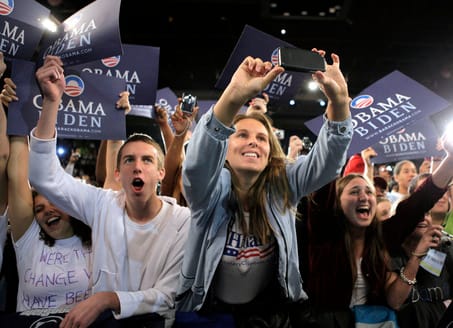Voting Age Questioned as Youth Voters Leave The Parties to Become Independent


In 1971 the 26th amendment to the United States Constitution was adopted, lowering the voting age from 21 to 18. Since that time, critics periodically call for returning the voting age to its original level or raising it higher than before. Today these calls are increasing in frequency and their message poses a grave threat to Independents and the country as a whole.
Editor-at-large of National Review and New York Times bestselling author Jonah Goldberg said, “I think the voting age should be much higher… they’re so frickin’ stupid about some things.” Peter Tucci, editor at The Daily Caller, supports raising the voting age to 25, citing research that shows brain development is not fully completed until this age. He writes, “The current voting age is predicated on the assumption that 18-year-olds have good judgment. Now that we know they don’t, why not adjust the voting age accordingly?” Conservative commentator and activist, Ann Coulter, said at the Conservative Political Action Conference, “I think the voting age should be raised to 40… maybe 30, but you need to get them out of the 12 years of propagandizing in the public schools.”
The problem here is that an issue of civil rights has become politicized. The vast majority of demands for a higher voting age are motivated by the voting tendencies of the young voter bloc. It has very little to do with the right of an 18 year old to vote and everything to do with winning elections: if the voting age had been 30 in 2008 as Ms. Coulter is requesting, President Obama could have very well lost the election.
Youth voters (aged 18-29) have been trending more and more Democratic and less and less Republican since 2000. Party-aligned young people are more likely to be Democrats, however, nearly 50% of young voters have left the parties altogether and identify as independent. Thus, the traditional view of a young voter (as liberal and apathetic towards politics) appears to be changing. Its not that young voters don’t care (they voted and campaigned in record numbers in 2008), they just don’t care for what political parties have to offer them.
At 18, one has reached the legal age of majority, and thus should achieve the legal right and privilege of voting, simple as that. To argue about frontal-lobe development (should the elderly be stripped of voting rights because of brain-functioning decline?) with the intent of benefiting a political agenda is what makes young people want to leave political parties in the first place.
Youth change the world. In the Middle East, young people just sparked some of the most revolutionary societal changes seen in decades. Having a vote is a simple way of having a say in the issues youth are to inherit. The student loan crisis, healthcare reform, immigration laws… these are issues that have potential to drastically affect young voters. It is unjust to take away the voice of a group so heavily involved in central issues.
The federal government should not spend time telling Americans whom they can and cannot marry, what substances they can and cannot put in their bodies, or what medical procedures it is ethical to have performed. These issues should transcend politics. Similarly, no one can decide whose ideas are sound enough to merit a say in Democracy. It appears once again that young people are the catalysts for change as they abandon the political parties stuck on these debates and move forward with independence.


